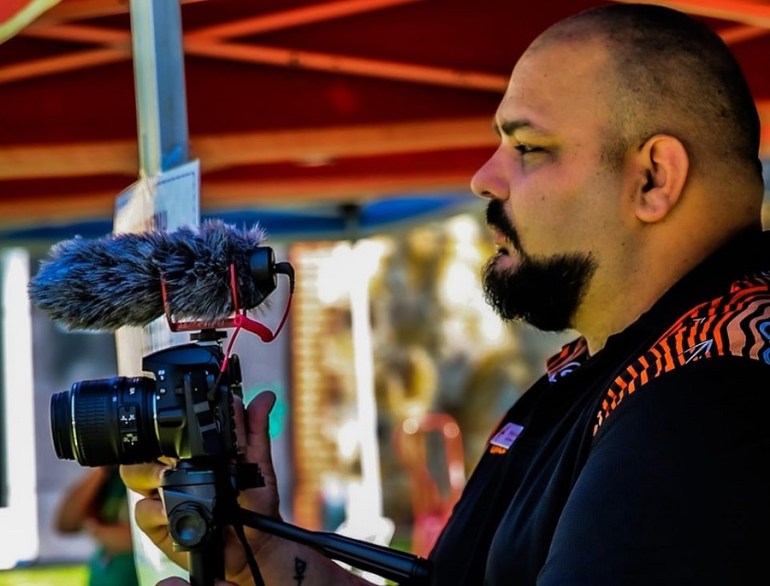Travis Akbar is the third recipient of the Centralised First Nations Documentary Australia Fellowship, with the filmmaker to receive a grant of up to $30,000 to develop his project Kuta New Wiltja (Toward New Camp), as well as up to $10,000 of in-kind support to attend training opportunities at AFTRS.
A Waljen man from the Wongutha First Nation of Western Australia’s Eastern Goldfields who was raised on Wirangu country near Ceduna, South Australia, Akbar’s documentary will retrace the journey of his great grandparents, Lali, a tribal Wongutha woman, and Afghan cameleer Jack Akbar, whose love was deemed illegal under the policies of the 1920s Western Australian Government’s “Chief Protector of Aborigines” A.O. Neville.
Beginning in Kalgoorlie, Western Australia, he and his sibling Skye will visit their family and Elders to yarn about the story of their ancestors before hitting the highway to camp where Jack and Lali camped, visit the places they visited, and see what they saw.
The film’s also going to explore Jack’s time teaching R.M Williams how to weave, Jack’s work in Renmark, and Jack and Lali’s move to Lyndhurst in remote South Australia.
Akbar, who last month was named as one of Australians in Film and Screen Australia’s Untapped participants, said being awarded the opportunity to explore and develop the personal project couldn’t have come at a better time.
“I have worked tirelessly for the last four years, with the support of my wife and children, to chase my dream, and the last few months have really shown me I am on the right track,” he said.
“But all of that, of course, has meant spending less time with my family, so to receive a fellowship for a project with the theme of family is not just a huge reward, but an incredible show of confidence in my ability.
“So thank you to Documentary Australia, the South Australian Film Corporation, and all the program partners.”
Presented by Documentary Australia, Screen Territory, the South Australian Film Corporation, National Indigenous Television (NITV), and the Australian Film Television and Radio School (AFTRS Indigenous), the fellowship is part of the Centralised initiative, which aims to create career pathways for First Nations screen creatives in South Australia and Northern Territory via mentoring, workshops, attachments, and internships.
Documentary Australia CEO Mitzi Goldman said it was “deeply satisfying” to be able to support the professional development of First Nations storytellers.
“Our country and culture as a whole will be enriched by the voices heard as a result of this initiative. I look forward to meeting Travis and discovering his story and am honoured that we can support him in this way.”
SAFC CEO Kate Croser described Akbar as an “extremely talented emerging screen creative” that her organisation was pleased to be able to support.
Screen Territory director Jennie Hughes said she looked forward to seeing Akbar’s story realised on screen.
“Screen Territory is delighted to be collaborating with our Centralised partners on this important initiative,” she said.
“The Centralised DA Fellowship provides a unique opportunity for SA and NT First Nations filmmakers to further hone their craft and to develop their documentary project.”
Akbar joins previous fellows Josh Trevorrow and Tamara Whyte.


